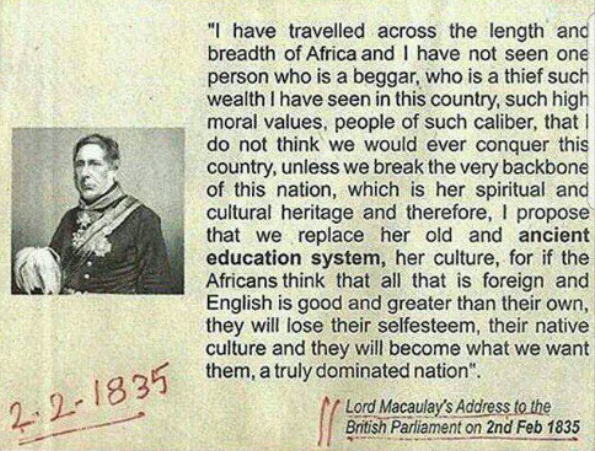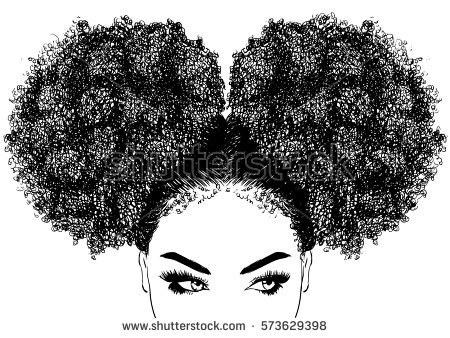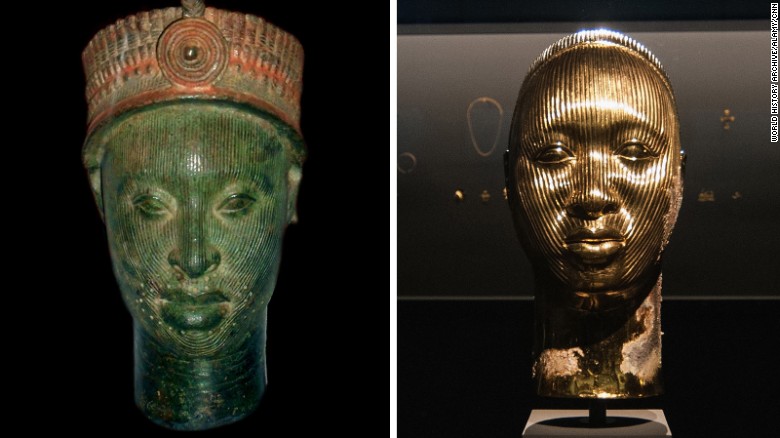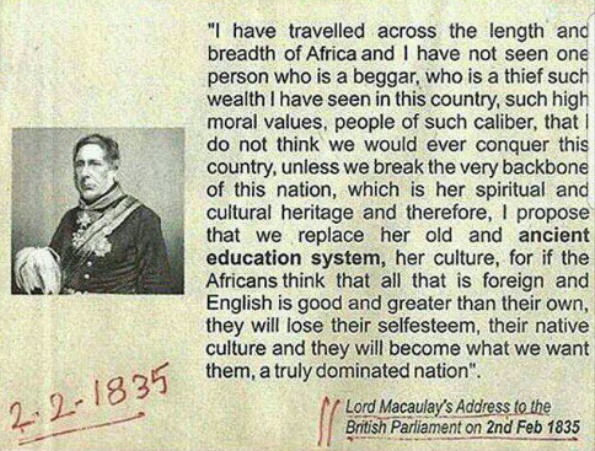We’ll be discussing these issues historically but firstly let us consider; what is Culture? Culture is ‘a way of life belonging to a group of people associated by geography, religion, race, ideals and other factors’.
The first major factor that affected Nigeria’s Cultural evolution was a Cultural assessment by the British. This can be seen in an excerpt from Lord Macaulay’s Address to the British Parliament on February 2, 1835 which went viral on the internet some time ago. It says;
‘I have traveled across the length and breadth of Africa and I have not seen one person who is a beggar, who is a thief. Such wealth I have seen in this country, such high moral values, people of such caliber, that I do not think we would ever conquer this country, unless we break the very backbone of this nation, which is her spiritual and cultural heritage and therefore, I propose that we replace her old and ancient education system, her culture, for if the Africans think that all that is foreign and English is good and greater than their own, they will lose their self-esteem, their native culture and they will become what we want them, a truly dominated nation.’

After this assessment of the African continent strategies were drawn and moves were made, ranging from the introduction of Christianity to Slave Trade. Consequently an inferiority complex was forced upon us leading to the next stage of our Cultural evolution; Cultural Glorification.
This next stage was as a result of our inferiority complex. At the arrival of the Whites we discovered that there was a bigger world outside the boundaries of our tribes and communities, so curiosity and envy got the better of us. However we could only gain access to this bigger world if we humbled ourselves to the Whites who seemed to know more than we did, so we did just that, we humbled ourselves. We wanted to learn. The Whites however took advantage of our child-like curiosity and enslaved us. Some of us were enslaved physically through slave trade while the rest of us (left behind) were enslaved mentally.

In physical slavery, the slaves (upon arrival at their masters’ homes) were made to do their masters’ bidding and any disobedience or rebellion on their part was met with physical punishments. In mental slavery Nigerians were forced to do the bidding of the colonial masters and rebellion was also met with punishments. However even after independence the slavery of the mind still continued; at this time the British still got their way(indirectly) by influencing politics and economical policies. Rebellion in the form of non-cooperation with the British was dealt with by the withdrawal of their support from the Nigerian economy or by turning rivals in the Nigerian government against each other.
Mental slavery is the direct cause of Cultural glorification in Nigeria. Such glorification can be seen in our everyday lives, in our food, language, dressing.
Food: Nigerians are known to eat with their hands but due to British influence they now prefer to eat with cutlery(spoon, forks and knives). For instance in some boarding schools in Nigeria, students are forced to eat food like Semo, Pounded yam and Eba with cutlery instead of their hands. When asked the school authorities say things like; ‘It is good manners to eat all food with cutlery and not your hands’ or ‘You look more cultured with cutlery’. Whose culture???
Language: In many multimedia companies today a criteria for being an On Air Personality is the ability to ‘Sound British’ or some weird foreign accent nobody can really identify (mostly a rough blend of American, British and Australian accents they heard on TV).
Dressing: A western suit is the acceptable ‘uniform’ in the Nigerian Corporate environment and traditional attires are only worn on Fridays or not at all. Lawyers and Judges still wear the British aristocratic Wig and Gown even though our weather is too hot for it. Women are more respected when they fix weaves than when they style their natural hair; it is even frowned upon altogether in some working places and even in some university faculties.

Entertainment: Most blogs and websites have more international fashion features than indigenous ones. They also display a lot of international music but demand for payment when indigenous artistes ask to have their songs put up. In an average Nigerian home(mine included) people walk around barefoot or wear slippers but in the movie industry (Nollywood) Nigerian actors wear high heels in the living room and wear heavy makeup to bed. Many musicians also started copying the American hip-hop and used Dictionary words that average Nigerians did not understand.
The Glorification of Western culture pushed our indigenous culture to the backseat. Nigerians became embarrassed of their accents, their dressing and other aspects of their culture. The whole world was into western culture(music, fashion and language), so the only way to be different was to move away from Western culture and that was exactly what the Europeans and Americans did, giving birth to Cultural Appropriation. The original purpose of Cultural Appropriation was purely Commercial, they wanted to sell a lifestyle and merchandise in a unique untried setting and they turned towards the same culture that we had ignored.
Cultural Appropriation can be perpetrated in two ways. Firstly it is the adoption of elements of a foreign culture without giving credit to that culture; and Secondly it is the adoption of elements of a foreign culture and using it out of context or in a way that diminishes its meaning. This Cultural Appropriation is mainly perpetrated by ‘The White Men’. We have to understand that the reason we are not getting credit for our own culture which they are using out of context is because of the ‘White Superiority Complex’. An ego we fed by our glorification of their culture.
In the case of Damien Hirst, he was accused of copying historical Nigerian artwork and using it out of context, the spiritual meanings of the artwork was diminished in Hirst’s work which constituted an insult to Nigerians, and guess what! He didn’t apologize for it.

As much as I would love to condemn Cultural Glorification I have to admit that it has its merits. If we did not glorify the English language at the expense of our many indigenous languages we would not be able to communicate amongst each other. We have over 500 languages in Nigeria and in every gathering of 50 there are at least 4 languages represented. Imagine how would we communicate to each other in this global age. How many Nigerians would be able to read an article written by a Chamba girl from Adamawa? In Adamawa state alone there are over 70 languages and so most people communicate in Hausa. Take note that there is no ‘Hausa Tribe’ in Adamawa, the language was just adapted as a way for members of different tribes to communicate amongst each other. So maybe it’s not all bad.
Finally the current stage of our Cultural evolution, Cultural Appreciation, came as a reaction to Cultural appropriation. To put it bluntly, we only started to appreciate our own culture after the whites started to appropriate it. All of a sudden a young girl who has saved up money for different lengths of weaves is now using it to buy natural hair products, why? Because Kim is trying to appropriate corn rows and she is offended so she wants to represent her culture by growing her natural hair and plaiting the proper and Original Cornrows. As sad as this may sound, it’s actually true; the only reason a large population of Nigerians are ‘loving their roots’ is because they see the value that the White man is putting on it. When we see the white man doing anything, the first reaction is to copy it, but in this case we discovered that these things we are about to copy actually belong to us, so now our eyes begin to open and we realize that what we have (have always had) is as good as (maybe even better than) everything we have been glorifying. So now working class women have started to go to work wearing their natural hair, tailors have started to sew casual and corporate outfits with Ankara fabric, more artistes are singing in their local dialects and OAPs have begun to speak in Clear Nigerian English.
This is not a criticism of our cultural appreciation rather it’s a plea that we take this appreciation to the next level by;
- Actually producing the things we claim to own; and
- Telling our own history so that outsiders would not have the opportunity to tell the story in a way that portrays them as the owners.
How do we do it?
- Let us practice primary entrepreneurship; for instance in the fashion industry designers and tailors are secondary entrepreneurs, the primary entrepreneurs are the fabric makers and manufacturers of sewing equipments. A remarkable example of a primary entrepreneur in the fashion business is Haowa Bello, a Fulani Lady from Adamawa State who rears goats for their skin which she uses to make bags and other accessories.
- Let our architects design buildings getting inspiration from our history and daily life
- Let artists express our culture through their art
- Let our dancers stop break-dancing and get their choreography from our local dances.
- Let our chefs present our food, how it is eaten locally and not in a weird way like we see online. Let them also mention the real local names of these food instead of renaming them in English.
And many other ways! Just make sure that whatever you do, you’re presenting the true Nigerian Culture.
Author: T.J. Gapsiso

